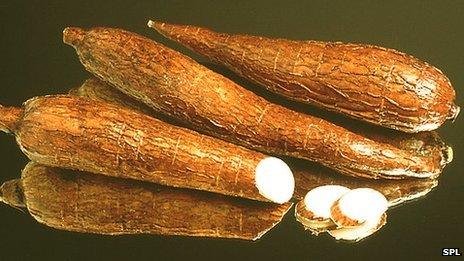UN warns of staple crop virus 'epidemic'
- Published

Farmers may think crops are healthy until harvest; the signs only show on roots
UN scientists are warning that a virus attacking the cassava plant is nearing an epidemic in parts of Africa.
Cassava is one of the world's most important crops providing up to a third of the calorie intake for many people.
The food and agriculture organisation of the UN says the situation is urgent and are calling for an increase in funding for surveillance.
None of the varieties of cassava being distributed to farmers in Africa appears to be resistant to the virus.
Cassava is a global food source of particular importance in Africa as it does well on poor soils with low rainfall.
But like many crops it is threatened by a number of pests and diseases that hinder its production. Viral infections have periodically wiped out the crop in some regions leading to famine.
Now the UN's Food and Agriculture Organization (FAO) says that another virus is threatening the crop in large parts of East Africa.
The scientists say the Cassava Brown Streak Disease (CBSD) is on the verge of becoming an epidemic. It first appeared in Uganda in 2006 but in the past few months has been found in Burundi and the Democratic Republic of Congo for the first time.
According to Mike Robson, a plant production and protection officer with the FAO it's hard to know exactly where the virus is as surveillance systems are poor.
"It is hard to say precisely but we're finding it where we go looking for it "
Robson says that a particular problem with this virus is that farmers may think they have a healthy crop until the harvest, as the symptoms only show on the roots.
"That's a particularly distressing situation where a farmer thinks he has a healthy field of cassava but when they come to uproot it, their expectations of food are not going to be met."
But there are some strategies that can help reduce the impact of the infection, according to Mike Robson.
"The main ways of controlling are to try and control the movement of planting material. Cassava is propagated from cuttings and if you move a cutting that has the infection you're effectively moving it to a new area"
"The other thing that farmers can do if they suspect they have the disease is to harvest early. They will get smaller roots of cassava but they will be less affected by the disease - it shows up late in the production cycle."
The FAO scientists say they are in a race against time with this particular strain of virus. They are calling for a rapid increase in funding to improve surveillance. They also want to improve training for farmers and they want to ban the distribution of infected plants between districts.
Some eight varieties of the crop are under development by the International Institute of Tropical Agriculture which show some level of resistance to CBSD - It is hoped that these varieties could be made widely available within two years.
- Published9 November 2011
- Published17 May 2011
- Published2 December 2010
- Published24 January 2011